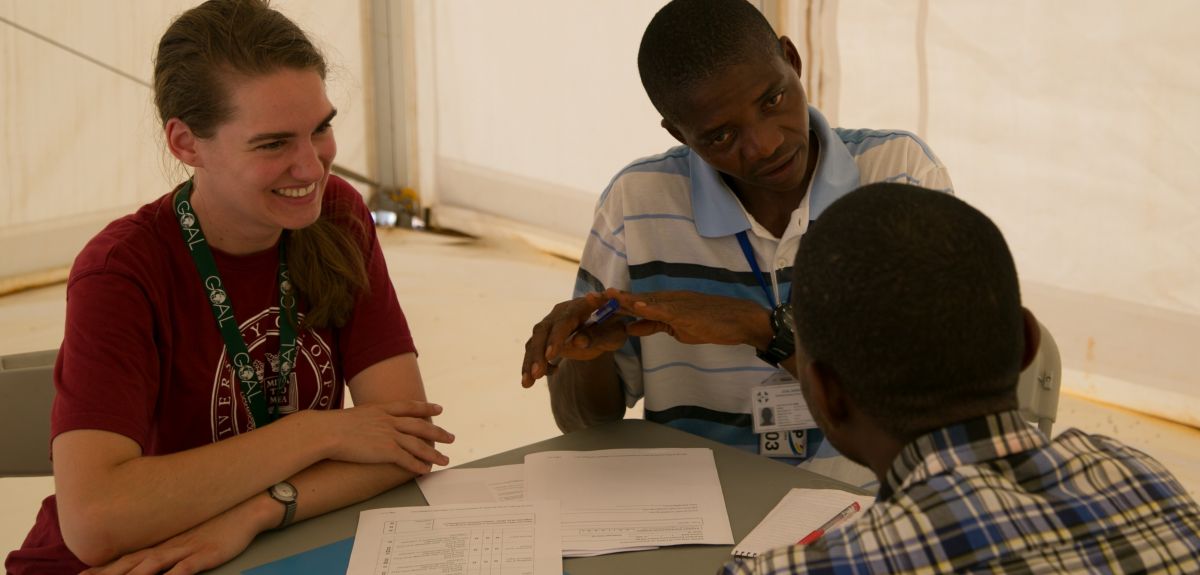
Image credit: ISARIC
£4.5 million award for clinical research consortium to tackle the global threat of epidemic infectious diseases
The International Severe Acute Respiratory and emerging Infections Consortium (ISARIC) has been awarded £4.5 million to accelerate clinical research to prevent illness and deaths from epidemic infectious diseases.
ISARIC – whose Global Support Centre is hosted by the University of Oxford – is a world-wide, grass-roots consortium of clinical research networks, working together on epidemic infections such as pandemic influenza, Ebola, Lassa fever, and plague.
Despite the enormous social and economic impact of epidemic infections , very little clinical research is done to find better ways to prevent, diagnose and treat these infections. This is because research on epidemic infections is difficult: outbreaks are unpredictable in their timing, location and magnitude, they start and finish quickly, they often occur in resource-poor settings, and the outbreak itself disrupts the delivery of healthcare. The mission of ISARIC is to overcome these difficulties and deliver the clinical research evidence that is needed to improve patient-care and inform public health responses.
With funding over the next five years from the Wellcome Trust, the UK Department for International Development, and the Bill & Melinda Gates Foundation, ISARIC will implement a series of initiatives including collaborative inter-epidemic research studies, pre-positioning of ‘epidemic’ research protocols, responsive research during outbreaks, career development fellowships and training.
To ensure ISARIC is a truly global asset and strengthens capabilities in low and middle income countries, the programme will be developed in close partnership with national authorities and the World Health Organization.
Professor Peter Horby, Executive Director of ISARIC, said: 'Patients are at the heart of every outbreak and they deserve to benefit from evidence-based medicine as much as anyone. This generous new funding will ensure that whenever and wherever epidemics occur, local teams are ready and able to do vital research to advance understanding and improve patient care.'
Dr Josie Golding, Programme Officer for epidemic preparedness and response at the Wellcome Trust, said: 'In the past 20 years we have seen a number of high-threat diseases emerging with pandemic potential, and we now, more than ever, appreciate the full cost of epidemics. Being prepared can help to mitigate the impact, but being prepared in itself is not enough. Activities need to be approved, implemented and most importantly, practiced, to give us the best chance of managing outbreaks. The new funding for ISARIC will bring together governments, researchers and the public in the areas most at risk to give countries the tools they need to react quickly and effectively when an epidemic inevitably occurs.'
Dr Madiha Hashmi, representing the Pakistan Society of Critical Care Medicine, said: 'Association with ISARIC triggered a multidisciplinary advocacy group on severe respiratory infections in the 600-bedded Aga Khan University Hospital in Karachi. However, most of the public sector hospitals in Pakistan, which counts a population of 200 million, lack research facilities. Continued funding of ISARIC will help build research capacity, while contributing evidence to improve outcomes in patients with serious emerging infections.'
 Amazonia's Fire Crises: Study shows emergency fire bans are insufficient and urges strategic action ahead of the next burning season
Amazonia's Fire Crises: Study shows emergency fire bans are insufficient and urges strategic action ahead of the next burning season
 New heart disease calculator could save lives by identifying high-risk patients missed by current tools
New heart disease calculator could save lives by identifying high-risk patients missed by current tools
 Study shows that island bats are valuable allies for farmers
Study shows that island bats are valuable allies for farmers
 Study reveals how humanity could unite to address global challenges
Study reveals how humanity could unite to address global challenges
 New Academic Champion for Policy Engagement appointed
New Academic Champion for Policy Engagement appointed